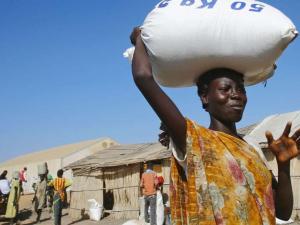
Hunger looms large in flood-ravaged South Sudan
Since July the United Nations and the Food and Agricultural organisation have been warning that South Sudan will face widespread hunger, but the government is not alarmed. Heavy rains and seasonal flooding since July last year have adversely affected more than a million farmers resulting in widespread damage to agriculture and property.
A recent analysis by the Integrated Food-Security Phase Classification (IPC) released December 24 indicates that life-threatening hunger is increasing rapidly in South Sudan and 7.5 million people, or two-thirds of the population in South Sudan, are expected to be in dire need of humanitarian assistance in the coming year.
The UN Children’s Fund (Unicef) has also warned that at least 4.1 million children in South Sudan will need humanitarian assistance in 2021.
Unicef further said it expects the food and nutrition crisis to continue in 2021 as there have been few gains in 2020 in addressing food insecurity and severe flooding in large parts of the country.
The UN agency also appealed for $197.8 million for 2021 to assist 5.1 million people, including 3.7 million children, affected by multiple shocks, including conflict, disease, drought and flooding.
“South Sudan children grow up thinking crises are normal. They are often hungry, exposed and susceptible to communicable diseases and are homeless due to flooding, said Dr Mohamed Ayoya, Unicef Representative in South Sudan.
Food production South Sudan is often affected either by floods of drought, as well as pockets of conflicts that still go on in some parts of the country,
More than 30 per cent of children between the ages of six months and five years in Pibor County suffer from acute malnutrition, double the level considered an emergency.
The analysis by IPC’s Famine Review Committee said that tens of thousands of people are facing catastrophic conditions in six South Sudanese Counties, with the worst being Pibor County. John Barsa, acting deputy administrator at the United States Agency for International Development said that the US is concerned by the worsening food-security situation and has donated more than $425 million in emergency food and nutrition assistance.
“We are extremely concerned that the government of South Sudan has not fully accepted the findings of this analysis. The political leaders must acknowledge the full extent of the food-insecurity and nutrition crisis in their country,” said Mr Barsa.
He said continuing fighting is hindering communities’ access to livelihoods, food, and other support, mostly in Western Pibor and the greater Tonj area.
Floods, conflict, and Covid-19 have combined to pose devastation food crisis; the combined result is the destruction of crops, livelihoods, and dwellings, impassable roads and supply chains crippled.
